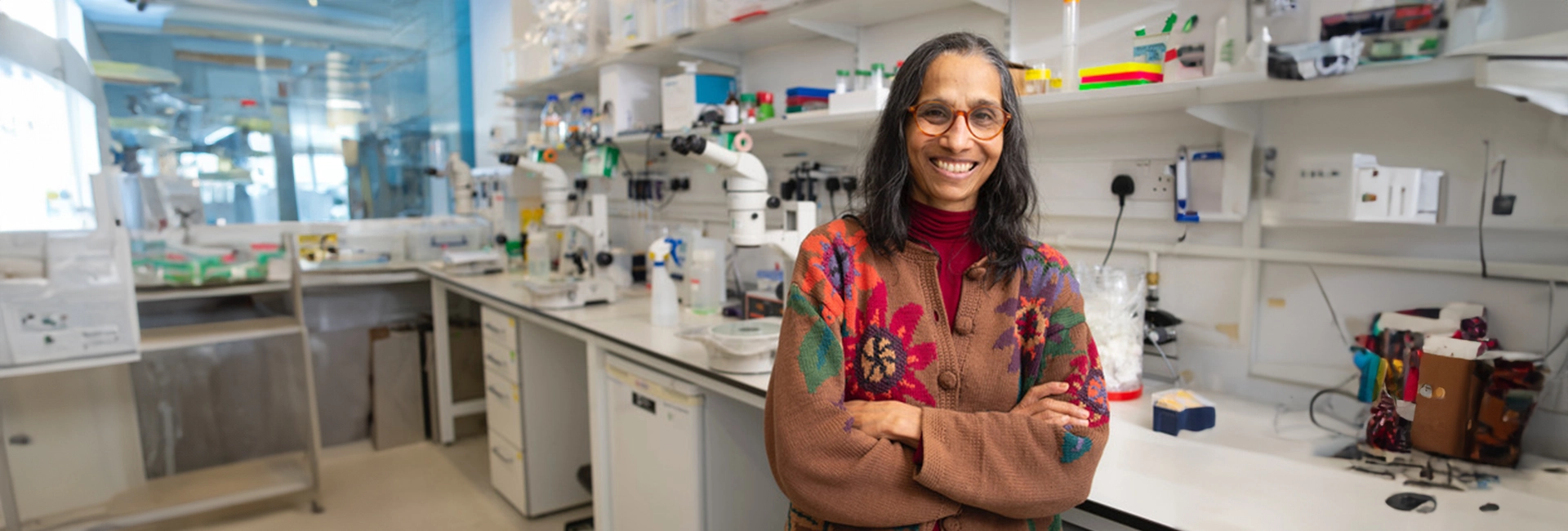(November 19, 2024) In the quiet labs of the University of Cambridge and the MRC Laboratory of Molecular Biology in Cambridge, groundbreaking discoveries are made in the fight against one of the world’s oldest and deadliest diseases—tuberculosis (TB). At the centre of this transformative work is Dr Lalita Ramakrishnan, a visionary scientist and physician who has pioneered the use of freshwater fish, the zebrafish as a model organism to unravel the complexities of TB. Her journey, spanning continents and disciplines, is as inspiring as her discoveries. In November 2024, her groundbreaking contributions were recognized with the prestigious Robert Koch Prize, awarded in Berlin. This accolade, endowed with €120,000, celebrates outstanding achievements in the field of infectious disease research and is a result of her lifelong dedication to science.
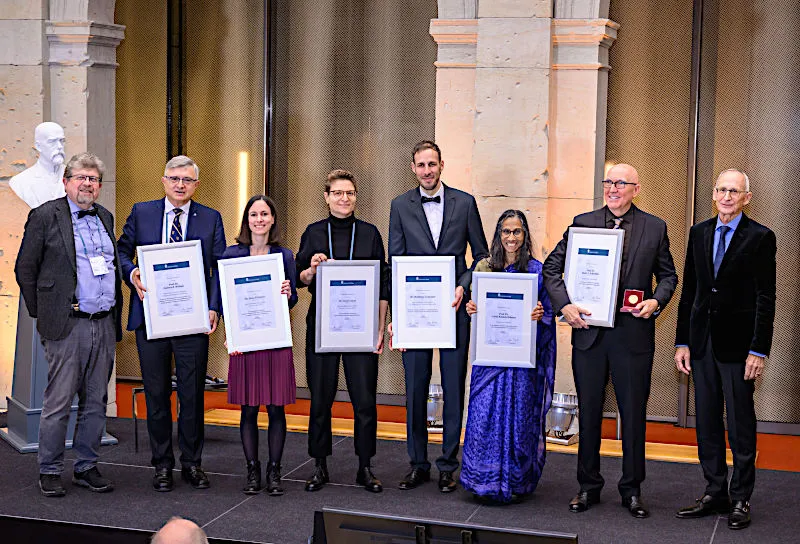
Lalita Ramakrishnan with other recipients of the 2024 Robert Koch Prize, in Berlin
The Robert Koch Prize is a highly esteemed scientific award presented annually by the Robert Koch Foundation to honor exceptional contributions to scientific research. Named after Robert Koch (1843–1910), the German physician who pioneered modern bacteriology and received the Nobel Prize in Medicine and Physiology in 1905, the award celebrates groundbreaking advancements in science.
Lalita Ramakrishnan’s efforts to address the deadly impact of tuberculosis are not confined to well-resourced countries. The Global Indian collaborates closely with clinicians in high-burden regions like India, Vietnam, and Indonesia to ensure that her findings reach those most affected “Clinical work is slow no matter where you are, but in under-resourced areas, it’s even more challenging. It’s crucial to bring these innovations where they’re needed most,” she emphasised.
Tuberculosis: A global health challenge
Tuberculosis (TB) is a contagious disease caused by Mycobacterium tuberculosis, primarily affecting the lungs but capable of impacting other parts of the body. It remains one of the world’s deadliest infectious diseases, claiming over 1.5 million lives annually, with millions more falling ill each year. TB disproportionately affects low and middle-income countries, perpetuating cycles of poverty and poor health. It’s drug-resistant strains pose a growing threat to global public health efforts.
Indian footprints in global science and health research
Driven by curiosity and ambition, many Indian researchers venture abroad to access advanced facilities, collaborate with leading global scientists, and explore cutting-edge technologies. These experiences not only enrich their expertise but also position them as key contributors to solving critical global health issues.
From pioneering affordable vaccines to advancing genomics and epidemiology, Indian scientists and researchers have consistently demonstrated excellence on the international stage. Figures like Lalita Ramakrishnan, a trailblazer in tuberculosis research, highlight India’s growing influence in shaping global health solutions.
Using the freshwater fish, zebrafish as model to study TB immunity
Lalita’s journey to using zebrafish for TB research began during her postdoctoral fellowship at Stanford University. Her mentor, Stanley Falkow, discouraged her from working on Mycobacterium tuberculosis, the bacteria that cause TB in humans, because it grows very slowly and requires special safety precautions. Instead, he suggested she try studying Mycobacterium marinum, a close relative that infects fish and amphibians.
Curious, Lalita dug into a bacteriology manual and decided to experiment with M. marinum in zebrafish larvae. These tiny, see-through fish turned out to be perfect for her research, as their transparent bodies made it possible to watch infections unfold under a microscope.
“When we saw granulomas, the hallmark structures of TB, forming in zebrafish, it was a eureka moment,” she said. This approach gave scientists a completely new way to understand how TB bacteria interact with the body’s immune system.
Early Influences: From India to a global stage
Lalita Ramakrishnan’s scientific journey began in Vadodara, India, where she was born in 1959 into a family of scientists. Along with her parents, her brother, Venki Ramakrishnan who is a Nobel laureate instilled in her a curiosity for science. While her mother’s battles with spinal tuberculosis left an indelible mark, exposing young Lalita to the harsh realities of the disease.
“I was only 17 when I began medical school in Baroda,” Lalita recalls, “but I soon realized that medicine alone wouldn’t satisfy my curiosity.” She later pursued a PhD in immunology at Tufts University in Boston, merging her medical training with research. “As I was doing my PhD, I saw medicine in a new light,” she shared.

She completed her medical residency at Tufts Medical Center, followed by a fellowship in infectious diseases at the University of California, San Francisco. It was during this time that her interest in TB crystallized. “TB was attractive to me because it is obviously a huge problem, but, at the same time, I found biology really fascinating,” she explained. Her postdoctoral work at Stanford University further cemented her path as she developed the zebrafish model that would become central to her groundbreaking research.
In 2001, Lalita Ramakrishnan set up her own lab at the University of Washington. There, she thrived in a dynamic research community, and her bold decision to use zebrafish led to groundbreaking discoveries that reshaped the understanding and treatment of TB.
Bridging basic science and clinical applications
Lalita’s research seamlessly bridges lab discoveries with human health implications. Her academic and professional journey also took her to Cambridge in 2014, where she joined the University of Cambridge as a Wellcome Trust Principal Research Fellow. This move marked another chapter in her career, allowing her to work in a globally renowned research environment in the United Kingdom. Here, she continued to expand her work on host-pathogen interactions, collaborating with scientists worldwide to translate her findings into clinical solutions.
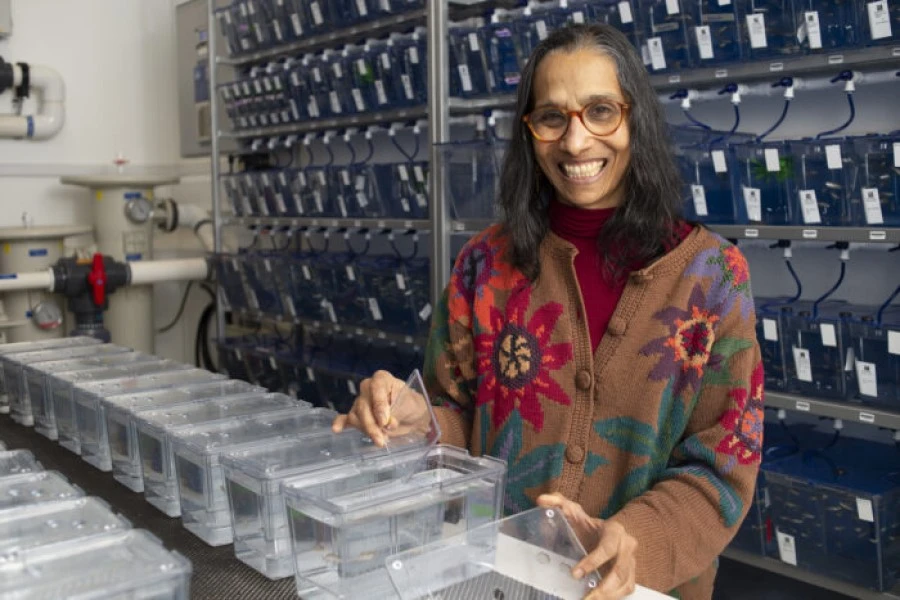
Beyond TB, Lalita has used zebrafish to study leprosy, uncovering how the bacteria cause nerve damage. Her insights have broad implications for infectious diseases and human biology. “The TB bacterium has evolved with us; understanding it helps us understand ourselves,” she reflected.
Addressing public health misconceptions
One of Lalita’s most important contributions was challenging the long-held belief that a third of the world’s population has latent TB. Her research showed that most people clear the bacteria within two years, proving that latent TB isn’t a lifelong condition as previously thought. “The realisation that the true number of latent cases is much lower makes the problem more solvable,” she explained.
This discovery has major public health benefits. Instead of focusing on an overestimated number of latent cases, resources can now be directed to recent infections and vulnerable groups. “If you think a quarter of the world is infected, the challenge feels insurmountable,” Lalita said. Her findings have even influenced the World Health Organization, helping to reshape global TB strategies. Lalita’s willingness to challenge established ideas has not only transformed TB research but also inspired a new generation of scientists to think critically and creatively.
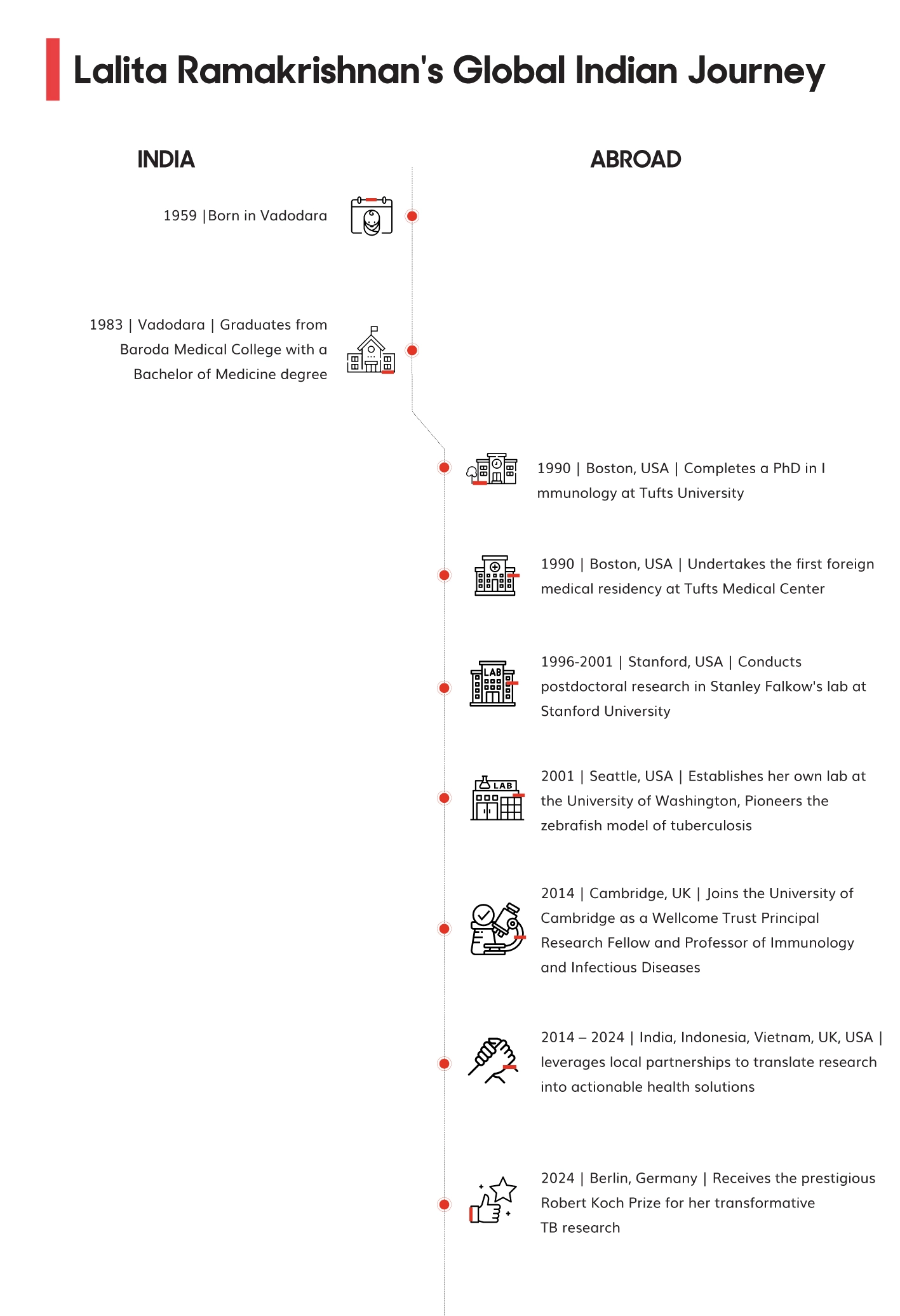
Life beyond the lab
Outside the lab, Lalita finds joy in cycling, cooking, and spending time with friends and family. Her global network of collaborators and former students testifies to the relationships she has built throughout her career. “Science is a team effort,” she said, “and it’s the people I’ve worked with who have made this journey so fulfilling.”
Despite her busy schedule, Lalita Ramakrishnan remains grounded, finding balance through hobbies and outdoor activities. Her love for cycling has not only kept her physically active but also allowed her to form friendships outside her professional sphere. “It’s a great way to stay connected with the world beyond science,” she shared.
A legacy of curiosity and impact
Lalita Ramakrishnan’s journey has redefined TB research and inspired countless scientists. As she continues to probe the mysteries of TB, she remains hopeful about the future. “Understanding TB is not just about solving a medical problem; it’s about understanding ourselves,” she said.
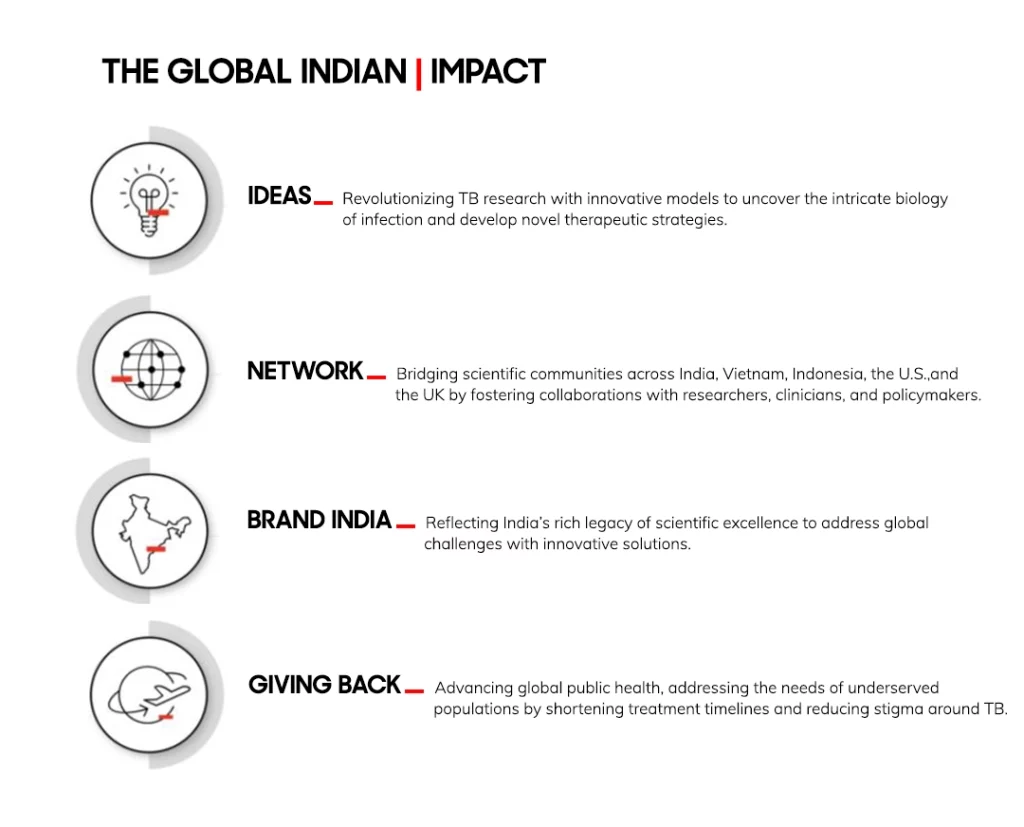
Through her pioneering work, Lalita Ramakrishnan has changed the narrative of TB, and illuminated a path for tackling the world’s most pressing health challenges. Her story highlights the enduring impact of science driven by compassion and curiosity. As an Indian researcher contributing significantly to global science, Lalita’s accomplishments also highlights the vital role of women in STEM, inspiring others to break barriers and pursue transformative research that benefits humanity.
Read a similar story of Sara Mathew, healthcare leader bridging global disparities.
